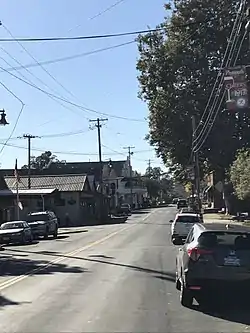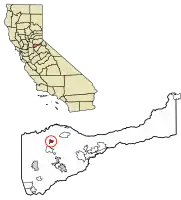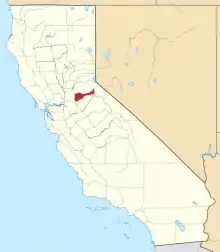Plymouth, California
Plymouth (formerly, Puckerville, Pokerville, and Poker Camp)[8] is a city in Amador County, California, United States. The population was 1,005 at the 2010 census.[9] The town was originally named Pokerville, when it was settled during the time of the gold rush. Plymouth is commonly now known as a "Gateway to Shenandoah Valley", a popular wine-producing region in the Sierra foothills. The Ione Band of Miwok Indians, a federally recognized tribe of Miwok people, is headquartered in Plymouth.[10]
Plymouth | |
|---|---|
 Main Street in Plymouth | |
| Nickname: Gateway to Shenandoah Valley | |
 | |
 Plymouth Location in California  Plymouth Plymouth (the United States) | |
| Coordinates: 38°28′55″N 120°50′41″W | |
| Country | |
| State | |
| County | Amador |
| Settled | 1853 |
| Incorporated | February 8, 1917[1] |
| Government | |
| • Mayor | Marianne Akerland |
| • Vice Mayor | Douglas Sim |
| • City Manager | Margaret Roberts |
| • State Senate State Assembly | Angelique Ashby (D)[2] Joe Patterson (R)[3] |
| • U. S. Congress | Mike Thompson (D)[4] |
| Area | |
| • Total | 2.60 sq mi (6.74 km2) |
| • Land | 2.59 sq mi (6.71 km2) |
| • Water | 0.01 sq mi (0.03 km2) 1.34% |
| Elevation | 1,083 ft (330 m) |
| Population (2010) | |
| • Total | 1,005 |
| • Estimate (2019)[7] | 1,076 |
| • Density | 415.28/sq mi (160.31/km2) |
| Time zone | UTC-8 (PST) |
| • Summer (DST) | UTC-7 (PDT) |
| ZIP code | 95669 |
| Area code | 209 |
| FIPS code | 06-57834 |
| GNIS feature IDs | 277579, 2411446 |
| Website | www |
Geography
Plymouth is located at 38°28′55″N 120°50′41″W[11]
According to the United States Census Bureau, the city has a total area of 0.9 square miles (2.3 square kilometers), of which 98.66 percent is land and 1.34 percent is water.
History
A post office was opened in 1871.[8] The city incorporated in 1917.[8] The Plymouth Trading Post is a registered as California Historical Landmark #41. [12]
Climate
According to the Köppen Climate Classification system, Plymouth has a warm-summer Mediterranean climate, abbreviated "Csa" on climate maps.[13]
Demographics
| Census | Pop. | Note | %± |
|---|---|---|---|
| 1880 | 740 | — | |
| 1890 | 768 | 3.8% | |
| 1920 | 657 | — | |
| 1930 | 343 | −47.8% | |
| 1940 | 460 | 34.1% | |
| 1950 | 382 | −17.0% | |
| 1960 | 489 | 28.0% | |
| 1970 | 501 | 2.5% | |
| 1980 | 699 | 39.5% | |
| 1990 | 811 | 16.0% | |
| 2000 | 980 | 20.8% | |
| 2010 | 1,005 | 2.6% | |
| 2019 (est.) | 1,076 | [7] | 7.1% |
| U.S. Decennial Census[14] | |||
2010
At the 2010 census Plymouth had a population of 1,005. The population density was 1,065.2 inhabitants per square mile (411.3/km2). The racial makeup of Plymouth was 850 (84.6%) White, three (0.3%) African American, 18 (1.8%) Native American, six (0.6%) Asian, two (0.2%) Pacific Islander, 70 (7.0%) from other races, and 56 (5.6%) from two or more races. Hispanic or Latino of any race were 183 people (18.2%).[15]
The census reported that 996 people (99.1% of the population) lived in households, nine (0.9%) lived in non-institutionalized group quarters, and no one was institutionalized.
There were 403 households, 130 (32.3%) had children under the age of 18 living in them, 185 (45.9%) were opposite-sex married couples living together, 41 (10.2%) had a female householder with no husband present, 23 (5.7%) had a male householder with no wife present. There were 28 (6.9%) unmarried opposite-sex partnerships, and two (0.5%) same-sex married couples or partnerships. 119 households (29.5%) were one person and 56 (13.9%) had someone living alone who was 65 or older. The average household size was 2.47. There were 249 families (61.8% of households); the average family size was 3.14.
The age distribution was 238 people (23.7%) under the age of 18, 75 people (7.5%) aged 18 to 24, 247 people (24.6%) aged 25 to 44, 290 people (28.9%) aged 45 to 64, and 155 people (15.4%) who were 65 or older. The median age was 40.1 years. For every 100 females, there were 85.1 males. For every 100 females age 18 and over, there were 87.1 males.
There were 493 housing units at an average density of 522.5 per square mile (201.7/km2),of which 403 were occupied, 259 (64.3%) by the owners and 144 (35.7%) by renters. The homeowner vacancy rate was 4.0 percent; the rental vacancy rate was 12.0 percent. 634 people (63.1% of the population) lived in owner-occupied housing units and 362 people (36.0%) lived in rental housing units.
2000
At the 2000 census there were 980 people in 392 households, including 272 families, in the city. The population density was 1,060.6 inhabitants per square mile (409.5/km2). There were 457 housing units at an average density of 494.6 per square mile (191.0/km2). The racial makeup of the city was 90.51% White, 0.20% Black or African American, 2.24% Native American, 1.12% Asian, 1.43% from other races, and 4.49% from two or more races. 5.10% of the population were Hispanic or Latino of any race.[16] Of the 392 households 36.2% had children under the age of 18 living with them, 48.2% were married couples living together, 17.6% had a female householder with no husband present, and 30.6% were non-families. 25.8% of households were one person and 13.5% were one person aged 65 or older. The average household size was 2.50 and the average family size was 2.99.
The age distribution was 29.3% under the age of 18, 5.2% from 18 to 24, 26.2% from 25 to 44, 22.4% from 45 to 64, and 16.8% 65 or older. The median age was 39 years. For every 100 females, there were 84.2 males. For every 100 females age 18 and over, there were 78.1 males.
The median income for a household in the city was $37,262, and the median family income was $43,611. Males had a median income of $32,411 versus $23,875 for females. The per capita income for the city was $16,197. About 9.3% of families and 10.4% of the population were below the poverty line, including 14.5% of those under age 18 and 8.5% of those age 65 or over.
References
- "California Cities by Incorporation Date". California Association of Local Agency Formation Commissions. Archived from the original (Word) on November 3, 2014. Retrieved March 27, 2013.
- "Senators". State of California. Retrieved March 18, 2013.
- "Members Assembly". State of California. Retrieved March 18, 2013.
- "California's 4th Congressional District - Representatives & District Map". Civic Impulse, LLC. Retrieved March 1, 2013.
- "2019 U.S. Gazetteer Files". United States Census Bureau. Retrieved July 1, 2020.
- "Plymouth". Geographic Names Information System. United States Geological Survey, United States Department of the Interior. Retrieved May 24, 2007.
- "Population and Housing Unit Estimates". United States Census Bureau. May 24, 2020. Retrieved May 27, 2020.
- Durham, David L. (1998). California's Geographic Names: A Gazetteer of Historic and Modern Names of the State. Clovis, Calif.: Word Dancer Press. p. 540. ISBN 1-884995-14-4.
- "Geographic Identifiers: 2010 Demographic Profile Data (G001): Plymouth city, California". U.S. Census Bureau, American Factfinder. Archived from the original on February 12, 2020. Retrieved May 1, 2013.
- "Tribes: List by Area." National Congress of American Indians. Retrieved 30 May 2012.
- .U.S. Geological Survey Geographic Names Information System: Plymouth, California
- "Big Bar". Office of Historic Preservation, California State Parks. Retrieved March 30, 2012.
- Climate Summary for Plymouth, California
- "Census of Population and Housing". Census.gov. Retrieved June 4, 2015.
- "2010 Census Interactive Population Search: CA - Plymouth city". U.S. Census Bureau. Archived from the original on July 15, 2014. Retrieved July 12, 2014.
- "U.S. Census website". United States Census Bureau. Retrieved January 31, 2008.
